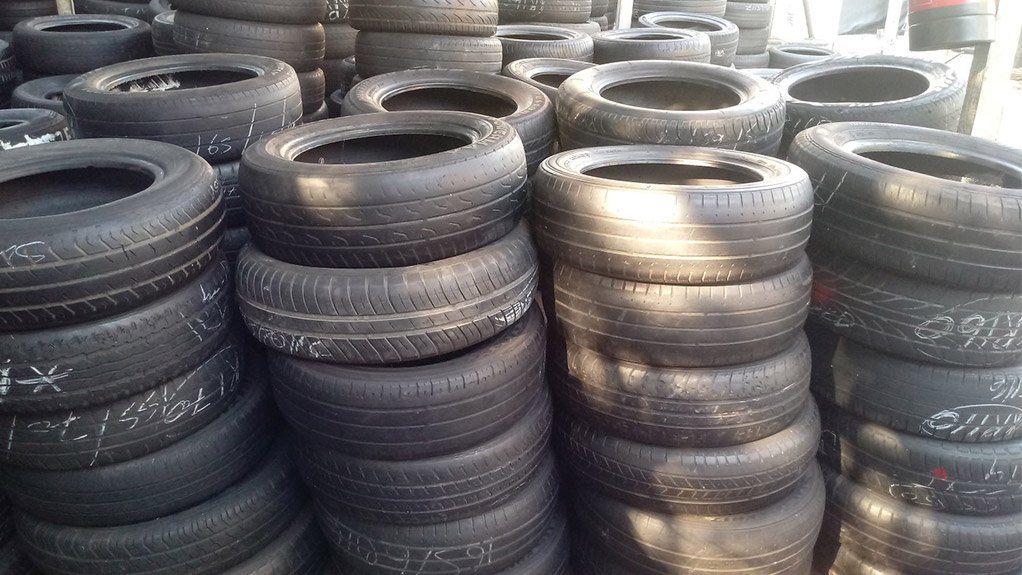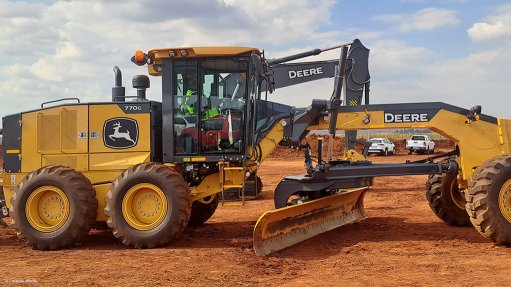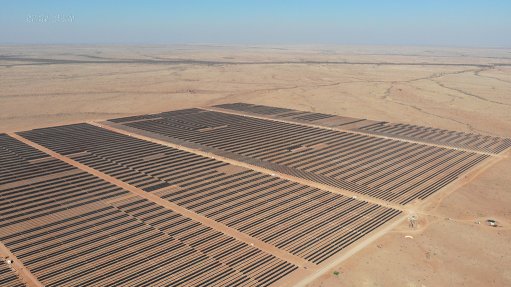Sumitomo Rubber South Africa partners with ‘Part Worn Africa’ initiative to champion Tyre Safety
This article has been supplied as a media statement and is not written by Creamer Media. It may be available only for a limited time on this website.
As South Africa commemorates Transport Month in October and a few days after the Global Road Safety Partnership’s “Africa Road Safety 2018” gathering in Cape Town from 23 to 24 October 2018 - Sumitomo Rubber South Africa, manufacturer of the popular Dunlop, Sumitomo and Falken tyre brands, has taken up the mantle as continental custodian and steward of Part Worn Africa, a new pan-African consumer, tyre and road safety advocacy initiative.
Announced today by professional African public policy, regulatory and government relations advisory firm, ETHICORE, Part Worn Africa is dedicated to improving and promoting consumer protection, product safety, responsible trade and environmental management of part-worn and second-hand passenger tyres.
In 2017, SRSA embarked on the Safety project – an initiative that is very close to the heart of CEO, Riaz Haffejee, who believes that the safety of SRSA’s customers is pivotal to the company’s success as a business. With this is mind, the #SaferthanSafe concept was born, and is a vehicle that SRSA is using to lobby its strong concerns about safe tyres, and particularly that of part-worn and second-hand tyres in the South African and African markets.
Often this is a more cost effective alternative to purchasing brand new tyres, especially for cash-strapped motor owners. However, what one may regard as a financial advantage, could cost them on the road.
SRSA CEO, Riaz Haffejee, said: “The use of second-hand tyres, where the buyer has no knowledge of the tyre’s age or repair history – together with the illegal and highly dangerous practice of ‘re-grooving’ tyres to create greater tread depth – are a significant cause for concern within South Africa’s informal tyre sector.
“As an African corporate citizen, consumer and tyre safety, included in the tyre manufacturing process, is part of SRSA’s DNA and culture. We recognise the causes and consequences of unsafe and unregulated part-worn and second-hand tyres - firstly, for consumers and road users, and secondly, for SRSA as a regulatory compliant tyre manufacturer. Our custodianship and support of Part Worn Africa seeks to advance our already well-established manufacturing, product and consumer safety initiatives such as our ‘SaferthanSafe’ campaign.”
Haffejee says that tackling the scourge of unregulated part-worn and second-hand passenger tyres is an industry imperative.
To date tyre safety remains a topical and relevant subject in South Africa with statistics from the Road Traffic Management Corporation which state that vehicle factors contributed to 7.8% of all road fatalities.
“Township and rural area tyre trading and fitment have in many cases been plagued by second-hand tyres and re-grooved tyres which result in road fatalities. SRSA has piloted and pioneered innovative and sustainable models for formalising informal tyre trade in South African townships, in a safe and compliant manner, while creating employment opportunities and driving entrepreneurship with safety at the core of the programme,” he said.
SRSA’s Dunlop Container Programme, for example, is centred around transforming township containers into Dunlop branded tyre fitment centres and providing opportunities for unemployed youth and women to be trained and mentored in tyre sales and repair. Today, the SRSA container initiative has grown exponentially to 120 containers nationally and SRSA continues to create awareness and education around this critical topic.
Various studies have shown that defective tyres are one of the leading contributors to fatal collisions – representing as much as two thirds of vehicle factors responsible for collisions.
Poor tyres can reduce the performance of a vehicle, increase stopping distance, raise the risk of skidding, and, if under-inflated or worn, will also increase fuel consumption and CO2 emissions.
In South Africa, while it is illegal for tyres to have less than 1mm of tread, this should be seen as an absolute minimum rather than the exact point at which a tyre should be changed. On a part-worn tyre, the tread will not be as deep as on a new tyre, thus providing less effective grip in wet conditions and potentially leading to aquaplaning.
SRSA’s latest Used Tyre Survey, which collects data by visiting various second hand tyre dealers in South Africa, reveals that:
In 2017, 58% of tyres sampled were illegal or previously repaired and therefore not fit for use on the road. This stood at 61% for the year to date as at 6 August 2018.
There are no controls governing the condition of second hand tyres being sold, and some dealers regroove the tyres themselves. This creates the impression that a tyre’s grooves are sufficiently deep, when the tyre is in fact damaged and dangerous.
Price is the first concern of dealers and consumers, who seldom gain the knowledge required to make good product recommendations or safe purchases.
Dunlop tyres have tread wear indicators built into the tyre’s tread grooves at 1.6 mm to indicate when they are worn.
Safety Regulations
In South Africa, all tyres for use on passenger and commercial vehicles and trailers must conform to the SABS compulsory specifications for safety.
The manufacturer must have implemented an internationally recognised Quality Management system and the tyres must conform to the applicable South African compulsory specifications and corresponding ECE Regulations and Directives.
Compulsory Specification: VC8056 ECE Regulation 30 applies to all new pneumatic (operated by air or gas under pressure) tyres for passenger cars and trailers, while Compulsory Specification: VC8059 ECE Regulation 54 pertains to new pneumatic tyres for commercial vehicles and trailers.
Both these regulations require tyres to have the ‘E’ mark on the tyre and the concomitant E Certificate as proof of compliance on the part of the manufacturer.
The following additional markings must also appear on the sidewall – Size, Tread Pattern, Load/Speed Index, “E” Mark, Date of manufacture, Radial/Bias and Whether tubeless or not.
To ensure compliance, all importers and manufacturers are responsible for homologation – meaning approval or official confirmation – of all tyres through the National Regulator for Compulsory Specifications (NRCS) before selling them. Homologation – introduced by the Minister of Trade and Industry on 1 January 1996 - represents a measure to minimise the risk of non-complying tyres being introduced to market and subsequently sold to the public.
However, Part Worn Africa highlights that unscrupulous operators still can and do take advantage of waste tyre disposal processes and the economic pressures and circumstances of consumers, by making available cheap but unsafe, ill-suited and illegal part-worn and second-hand tyres that have not been stringently tested for safety against regulated standards and specifications.
In some instances, these tyres are imported and dumped into African markets from other jurisdictions where they are no longer fit or safe for use and are often also ill-suited to Africa’s climatic and road conditions. This is further exacerbated by weak import control and trade administration.
Currently in South Africa waste tyres are regulated by the Waste Tyre Regulations 2017 which repealed the 2009 Waste Tyre Regulations and form part of the National Environmental Management: Waste Act 59 of 2008.
Commenting on the formation of Part Worn Africa, ETHICORE CEO Abdul Waheed Patel said: “Part Worn Africa is set to fulfil a critical gap in working with key stakeholders to address the policy, legislative and regulatory deficits governing the proliferation of unsafe, ill-suited and illicit part-worn and second-tyres sold and fitted for use on public roads in Africa.”
With consumer safety as a key priority on the SRSA’s corporate agenda, the company has now engaged Ethicore, and through Pan-Worn Africa will take its safety concerns forward.
For more, visit http://www.srigroup.co.za/home and http://www.partworn.org
Comments
Press Office
Announcements
What's On
Subscribe to improve your user experience...
Option 1 (equivalent of R125 a month):
Receive a weekly copy of Creamer Media's Engineering News & Mining Weekly magazine
(print copy for those in South Africa and e-magazine for those outside of South Africa)
Receive daily email newsletters
Access to full search results
Access archive of magazine back copies
Access to Projects in Progress
Access to ONE Research Report of your choice in PDF format
Option 2 (equivalent of R375 a month):
All benefits from Option 1
PLUS
Access to Creamer Media's Research Channel Africa for ALL Research Reports, in PDF format, on various industrial and mining sectors
including Electricity; Water; Energy Transition; Hydrogen; Roads, Rail and Ports; Coal; Gold; Platinum; Battery Metals; etc.
Already a subscriber?
Forgotten your password?
Receive weekly copy of Creamer Media's Engineering News & Mining Weekly magazine (print copy for those in South Africa and e-magazine for those outside of South Africa)
➕
Recieve daily email newsletters
➕
Access to full search results
➕
Access archive of magazine back copies
➕
Access to Projects in Progress
➕
Access to ONE Research Report of your choice in PDF format
RESEARCH CHANNEL AFRICA
R4500 (equivalent of R375 a month)
SUBSCRIBEAll benefits from Option 1
➕
Access to Creamer Media's Research Channel Africa for ALL Research Reports on various industrial and mining sectors, in PDF format, including on:
Electricity
➕
Water
➕
Energy Transition
➕
Hydrogen
➕
Roads, Rail and Ports
➕
Coal
➕
Gold
➕
Platinum
➕
Battery Metals
➕
etc.
Receive all benefits from Option 1 or Option 2 delivered to numerous people at your company
➕
Multiple User names and Passwords for simultaneous log-ins
➕
Intranet integration access to all in your organisation





















